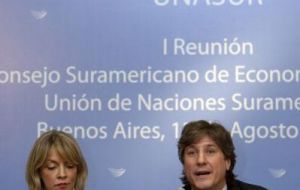MercoPress. South Atlantic News Agency
Unasur creates three task groups to protect the region from ‘industrialized north crises’
 Argentine Economy minister Amado Boudou hosted the meeting in Buenos Aires
Argentine Economy minister Amado Boudou hosted the meeting in Buenos Aires The Union of South American Nations must act quickly to protect the region's growing economies from another global financial crisis, Economy ministers and Central bankers from the 12-nation organization agreed at an emergency meeting convened Friday in Buenos Aires.
Proposals include expanding a special Latin American reserve fund, FLAR, investing reserves in projects that will lead to increased commerce within the region, trading in a basket of local currencies rather than the dollar or Euro, and other ways of making the region's economies more independent from those of industrialized nations to the north.
Three different task groups will address each of the points and have reports ready for the next Unasur Economic council meeting.
“We are working on setting up a counter-cyclical regional fund that would confront a financial crisis” said Argentine Economy minister Amado Boudou. The fund could draw from monetary reserves or central banks from countries in the region, which manage some 500 billion dollars, according to the Economic Commission for Latin America and the Caribbean.
The funds would possibly be an extension of the Latin-American Reserve Funds (FLAR), which already serves as an assistance mechanism to its seven-member countries in case of financial turmoil.
Created several decades ago, FLAR brings together Bolivia, Colombia, Costa Rica, Ecuador, Peru, Uruguay and Venezuela. The two largest economies in the region, Brazil and Argentina, could increase the funds' effectiveness if they decide to join.
South America's economies are growing at a healthy 4.5% on average this year, but creating deeper and stronger financial and commercial ties within the region is essential to keeping these hard-won gains from melting away, Argentine Economy Minister Amado Boudou said.
“The crisis obligates us to redouble our efforts,” Boudou said. He defined the group's mission as creating solutions made by and for South Americans, rather than following what he called the bad advice of global financial institutions such as the International Monetary Fund.
“Today they can no longer impose policies on us, and this is another important thing for our people,” Boudou said.
In its final statement the Unasur ministerial council said that “ the financial crisis initiated by the developed countries in 2008 continues unsolved” and argues that is spite of the several adjustments, “mistrust persists” particularly referred to “its capacity to maintain sustainable levels of debt”.
Unasur therefore considers ‘viable’ the promotion of a new financial architecture for the region but “strengthening and adapting the existent one”.
“Beyond our different positions there is a strong will to reach an understanding”, said Boudou. In the new world economy South America has a relevant part to play and can become one of the leading engines for the international economy”.
Unasur Secretary General Maria Emma Mejia said that “one first and clear decision is to strengthen inter-regional trade which today stands at 120 billion dollars”. Using local currencies in trade will enable the countries of the region “to preserve their international reserves” if they have to face the challenge of another crisis from the north added, the Argentine Economy minister.
Three different task groups were agreed to define concrete measures to be presented at the following meeting. The first group with Peru and Colombia will look for an ample mechanism of reserves coordination to help expand the Latin American Reserves Fund, FLAR, thus increasing the capacity of central banks from the region to protect their currencies from speculation attacks.
The second team (Uruguay and Venezuela) will review different systems for the use of local currencies to promote trade and increasingly abandon the US dollar, white a third group (Chile and Brazil) will deal with development banking, strengthening the Andean promotion corporation, CAF, and working to establish the Bank of the South.
Argentina will hold the presidency of the Unasur Economy and Finance Council.
Ecuadorian Central Bank President Diego Borja called for the implementation of the three immediate actions, all of which would help decouple the region from U.S. monetary policy, he said.
“Why are we still tied up with the Federal Reserve? There's no good explanation for this” said Borja.
Ecuador is more dependent on the US dollar than any other Latin American nation, having abandoned its own currency and monetary policy and adopted the dollar as the country's currency to restore economic stability. Now the weakening US dollar and the prospect of another recession has Ecuadorians thinking about re-establishing their own currency, he said.
“It's a demand of the Ecuadorian society,” Borja said. ”For the moment, the Ecuadorian government is keeping to the dollarization scheme, but beyond that we have to protect the region from this crisis
Unasur is made up of Argentina, Brazil, Colombia, Bolivia, Chile, Ecuador, Guyana, Paraguay, Peru, Surinam, Uruguay and Venezuela.




Top Comments
Disclaimer & comment rules-

-

Read all commentsare you ready for the helping to Peru ...??
Aug 15th, 2011 - 09:40 am 0I think that to understand what forces are conducting world economies since 1980, or perhaps before that, all should read Donna Haraway's “A Cyborg Manifesto: Science, Technology, and Socialist-Feminism in the Late Twentieth Century” which is found to be read online and/or print at the following link:
Aug 16th, 2011 - 07:52 pm 0http://lcc.gatech.edu/~bmagerko6/classes/LCC6310/slides/lcc6310_reading08.pdf
Cheers!
Commenting for this story is now closed.
If you have a Facebook account, become a fan and comment on our Facebook Page!